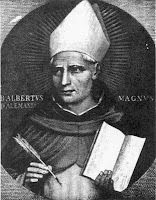 Love effects a likeness between the lover and the object loved... He who loves a creature, then, is as low as that creature, and in some way even lower, because love not only equates, but even subjects the lover to the loved object. By the mere fact, then, that a man loves something, his soul becomes incapable of pure union and transformation in God... Until a man is purged of his attachments he will not be equipped to possess God, neither here below through the pure transformation of love, nor in heaven through the beatific vision... Love causes equality and likeness and even brings the lover lower than the object of his love... All of the world's wisdom and human ability contrasted with the infinite wisdom of God is pure and utter ignorance... Anyone, therefore, who values his knowledge and ability as a means of reaching union with the wisdom of God is highly ignorant in God's sight and will be left behind, far away from this wisdom. Ignorance does not grasp what wisdom is; and in God's sight those who think they have some wisdom are very ignorant... Only those who set aside their own knowledge and walk in God's service like unlearned children receive wisdom from God... Accordingly, a man must advance to union with God's wisdom by unknowing rather than knowing.
Love effects a likeness between the lover and the object loved... He who loves a creature, then, is as low as that creature, and in some way even lower, because love not only equates, but even subjects the lover to the loved object. By the mere fact, then, that a man loves something, his soul becomes incapable of pure union and transformation in God... Until a man is purged of his attachments he will not be equipped to possess God, neither here below through the pure transformation of love, nor in heaven through the beatific vision... Love causes equality and likeness and even brings the lover lower than the object of his love... All of the world's wisdom and human ability contrasted with the infinite wisdom of God is pure and utter ignorance... Anyone, therefore, who values his knowledge and ability as a means of reaching union with the wisdom of God is highly ignorant in God's sight and will be left behind, far away from this wisdom. Ignorance does not grasp what wisdom is; and in God's sight those who think they have some wisdom are very ignorant... Only those who set aside their own knowledge and walk in God's service like unlearned children receive wisdom from God... Accordingly, a man must advance to union with God's wisdom by unknowing rather than knowing. -Saint John of the Cross
Saint John of the Cross (1591) is called the Mystical Doctor.







































